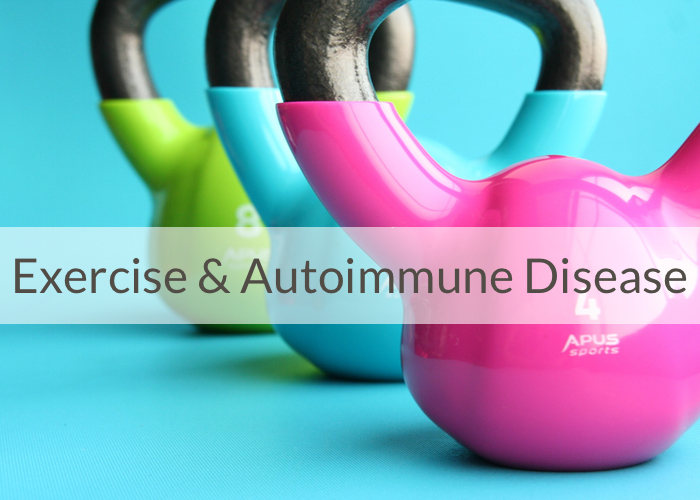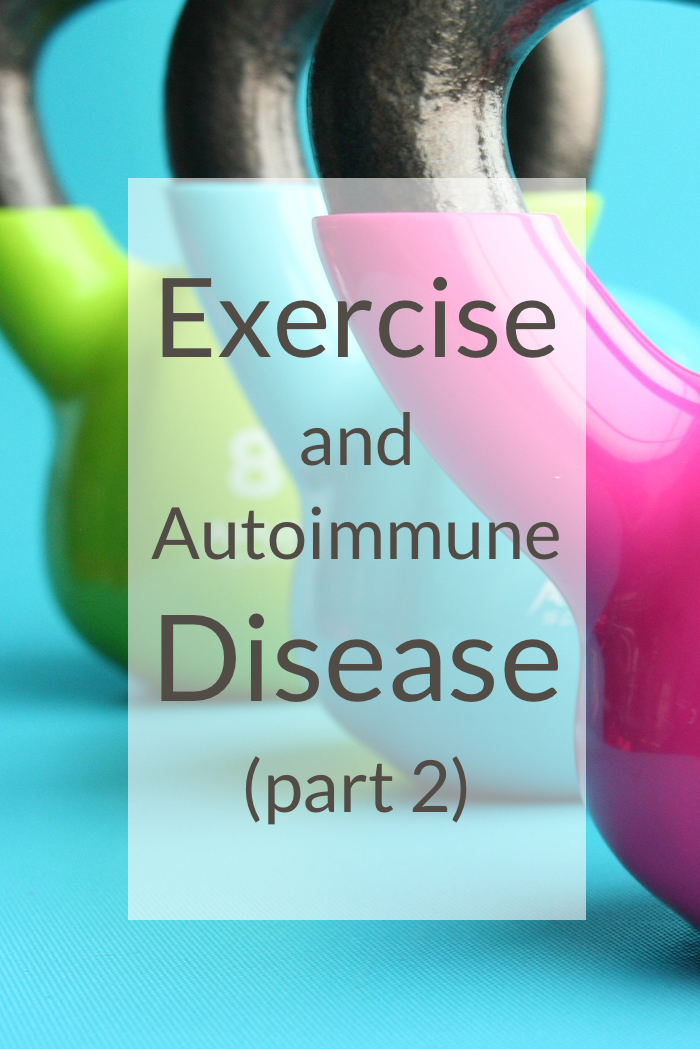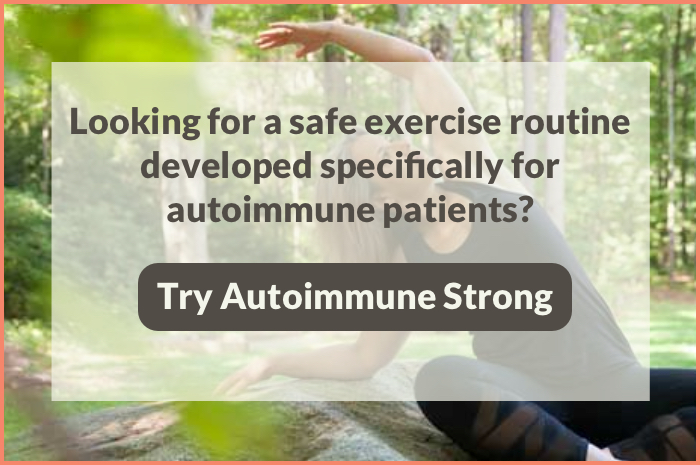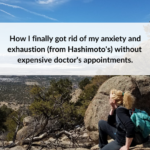 Whether you have an autoimmune disease or not, exercise plays an important role in your overall health and well-being. But if you are suffering from an autoimmune disease, exercising becomes trickier. A while back, I shared my best tips to ease into an exercise routine, stressing how important it is to take it slowly and listen to your body. I would like to give you an update today because a lot has happened in my life since I wrote that post, including that I have been working with a personal trainer and weathering a huge autoimmune flare-up.
Whether you have an autoimmune disease or not, exercise plays an important role in your overall health and well-being. But if you are suffering from an autoimmune disease, exercising becomes trickier. A while back, I shared my best tips to ease into an exercise routine, stressing how important it is to take it slowly and listen to your body. I would like to give you an update today because a lot has happened in my life since I wrote that post, including that I have been working with a personal trainer and weathering a huge autoimmune flare-up.
In late 2015, I started working with a personal trainer at a local gym. This person (let’s call him Coach B) was recommended to me by my functional medicine practitioner. This solution was the best for me at the time because I needed the outside accountability to move my butt!! I had tried to keep a regular exercise routine before that without success. During our evaluation meeting, I made sure to tell Coach B about my autoimmune issues and my current limitations (I can’t do high-impact exercise because of my joints). He took the time to listen, which was an excellent starting point! He developed a specific routine tailored to my needs, including cardio, HIIT training, weight training, core, and stretches. I was excited to get started!
It was very rough at the beginning for me; I was sore all over and so tired that I had to take naps during the day. Soon, I developed lower back pain. I thought it was normal for my body to hurt because I had been inactive for such a long time. Then, after 3 months, I started noticing I had an irregular heartbeat when I was resting. I would be sitting, watching TV, and all of a sudden my heart would skip several beats. It would last for a few seconds before returning to normal. At that point, I realized that my exercise routine was too hard on my body and was causing more harm than good. I was feeling frustrated with my limitations, but I decided to stop, heeding my own advice!
Shortly after this, life threw me a curveball and I went through an intense period of stress that lasted for most of 2016. I also took several airplane trips which were quite tiring (including attending PaleoFX in Austin, Texas), all the while keeping up with work and my family life.
Fast forward to January 2017. I got the nasty flu that was going around, and it was bad. I don’t remember being that sick for a very long time. I couldn’t shake off the sickness, and my sleep was suffering from it. I was exhausted at that point. Then in February, I had heavy dental surgery. The procedure went well in itself, but unfortunately, I developed an infection, requiring that I take a round of antibiotics. I was reluctant to take them, but there was no way around it.
That was the turning point for me, and my weak body couldn’t take it anymore. I went into a huge autoimmune flare that lasted for weeks, leaving me feeling like all the life had been sucked out of me.
Looking back, I can see all the warning signs and the storm coming on. It is like watching a train wreck in slow motion. I had been driving myself too hard for too long and, even if I was eating right, stress had finally caught up with me. If I had “reserves” before, I had used them all up. I was at the end of my resilience.
What did I do? Well, there isn’t much you can do besides hitting the brakes and seriously taking care of yourself! For me, it meant working less, taking walks in nature, self-reflection, hot baths with lavender essential oil, working on my sleep, etc. I also talked to my doctor, and he gave me supplements to support my body and give me more energy. And also acknowledging the fact that it was okay to feel like a slug, knowing that it would pass. Remaining hopeful that better days would come soon.
It took weeks and even months to start feeling better with focused self-care. As I write this post, I started exercising again about a month ago, but at a slower pace. I am going back to the gym, but this time around I am working alone. I have developed my little exercise routine. I try to exercise every other day mindfully. I started slowly, allowing myself super light days when I need them. Right now, I am happy when I show up, and I don’t impose on myself goals to attain (such as lifting x amount of weight or doing cardio for y minutes). I would describe my current exercise regimen as light to moderate, and I am feeling good. My sleep has improved, and I am feeling better in my skin. I can tell that I am on the other side of this bad autoimmune flare and things are looking up!
Here are the lessons I took away from all this:
1) Stress can derail your life, even if you are eating right.
2) Exercise is good for you, even if you have an autoimmune disease, but take it slowly and listen to the signals your body is sending you.
3) An autoimmune flare is hard, but you can recover from it with mindfulness and focused self-care.
4) A positive mindset is important; remain hopeful!
If you enjoyed this post and are looking for more information on exercise with an autoimmune disease, read these as well:
- 9 tips to exercise safely with an autoimmune disease
- Exercise and autoimmune disease: beneficial or dangerous?
- Safe exercise for autoimmune disease
Click it to pin it!









Great post, Sophie! I’m two years into my health struggles and still trying to figure everything out. Hashimoto’s is definitely a piece of the puzzle for me but I’ve yet to find a way to live consistently well, free of pain and nagging symptoms. I used to be a very big exerciser, hitting the gym 4-5 times per week. I recently started going again and find that it helps me tremendously. I’m still feeling out my balance but it’s been an important step for me, both physically and emotionally. Thanks again for this post and for everything that you do!
Thank you so much for your feedback Lauren! I also feel better when I can exercise. The trick is to find the sweet spot where we get the benefits from it, without triggering a flare up!
I’m currently going through a flareup myself. Arthritis flare up in my hands. We are moving for the fourth time in five years and this time we will be homeless. It’s a good thing. We’re going on the road for the rest of the year, traveling and using VRBO for lodging. But it’s incredibly stressful putting all of your belongings into storage, getting moved was strenuous (packing and cleaning) and then the driving is also very tiring. I brought my InstantPot along for the trip and I’m making my own food, so that helps. But as I’m typing this my hands are hurting. I’ve brought along my yoga mat and I’ll be doing yin yoga along the way which really helps with the driving. And I have several videos bookmarked regarding alignment. I find doing them helps with the sitting all day in the car. Getting from California to New Hampshire is about 3,000 miles of driving. Not to mention the weather we’ll be going through. Tornadoes right in our path yesterday killed a dozen people. So life throws some curveballs, have to mitigate what you can and move forward. This trip is going to be fun and exciting but it does take a toll.
My goodness Cheryl what an adventure! Many people in your situation would balk at the idea of undertaking such a trip. But it seems that you have coping strategies in place. Good luck and best wishes! It also sounds like a lot of fun 🙂
A very timely post for me. I certainly hear your pain!! I’m in the middle of a huge flare-up as well. I have been researching and shopping for a new bed base and organic/toxin free mattress/mattress pads/sheets/head board/footboard to help me with greater nightime comfort and hopefully better and more restful sleep. (I have been waking up for months now soaked and cold from a 35 year old leaking waterbed mattress.) This activity should have been a positive “in health” move but instead the stress has given me a huge flare from chronic and painful bacterial infections. Six of them at once!
I am also undergoing a experimental IV treatment to help these infections (Major hemotherapy using Ozone) and instead of improving my skin infections it has been causing them to flare. It is the old two steps forwards/one step back thing. I am trying to make it without using antobiotics but this is so hard, I am going on 50 years of chronic infections which AIP have helped but the current stress has brough them back with a vengence. I am tired and worn out with so many years of chronic pain…I am working on my AIP protocol, stress reduction, supplements, IV treatment and other healthy living acs but what I need is a support person to help me through this to take care of me; but instead I take care of my our home, property, animals and my husband (with both autoimmune and memory issues) as well as myself and I always seem to get the short end of the stick. Sigh…
Hello Donna,
Thank you so much for your comment. Life with an autoimmune disease is definitely rough, with ups and downs. If you decide to go the antibiotics route, make sure you supplement with a lot of good probiotics to limit the damage to your gut microflora. Hang in there my friend.
I am finding that every time I get 2-3 weeks into a routine of working out consistently, I have a flare and then get sick with upper respiratory infections. It’s frustrating, it takes me weeks to get over my illness and the flare. I want so badly to be strong and able to exercise but my body is telling otherwise at this time. Thanks for sharing your journey, glad to know I’m not alone!
Hello Julie,
I hear you! It is so frustrating. There is such a gap between what we wish we could accomplish and what we can actually do! For the time being, I would suggest that you take it slower. Gentle exercise. Stretches. Nothing more until you build up some resilience. Good luck friend 🙂
I was working out vigorously before I developed my autoimmune diseases: running, lifting weights, and doing P90x. For me, good health equaled working out. I have had to change my thinking and found a balance of light exercise and rest is necessary. Currently walking, yoga, and the eliptical compose my exercise regime. More is not better and is likely inflammatory.
Thank you so much Lynn for your feedback. I totally agree with your comment that more is not especially better! Too much exercise (with an autoimmune disease) is inflammatory and triggers flares. On the bright side, this is just a phase and it is possible to get stronger, little by little, and start enjoying again a certain level of exercise. Good luck to you!
So very happy that phase of your life is coming to a close! Yes, I believe that we all need exercise, but for me that means stretching and long walks with my dog. “Training” is for serious athletes, not me! I don’t find it enjoyable, it’s more work than fun. For me there is nothing better that being outside, walking, listening to the sounds of nature and hopefully the sun is shining (not much of that lately). Sleep is very important to me too, My guidelines for good health are diet, sleep and time spent outside, walking. Life is a work in progress, isn’t it? What worked last year might not be what we need this year. We have to have an open mind and be willing to realize that as we get older we can’t always do the things we used to, a tough one. We really have to LISTEN to our bodies. They tell us what we need, don’t need. I also realized that being busy is not a virtue! I have slowed down quite a bit lately and am having a lot more fun! All the best, Sophie., so glad you’re feeling better!
Thank you Valerie for your words of encouragement 🙂 As you mentioned, sleep is also a big part of the puzzle!
So glad you are feeling better Sophie. I used to run moderately long distance and imagine that was a huge stress on my body the many years Hashimotos was brewing. I am just a year into my healing with A.I.P and lifestyle changes. For exercise I now walk slow in beautiful natural surroundings on days when I’m up to it., no more making myself has been an important step for me.I’m glad you are choosing what feels right for you. Many Blessings to You
Thank you for your kind words Gale 🙂 A slow walk in beautiful nature sounds about wonderful!
Your post and all these comments have helped me so much today. I am having my second cold/flu since February. After a week my friend is back you normal. Me I am still coughing and exhausted. I feel guilty that I am still so tired and can’t get much done!! I thought feeding myself well would solve everything. Hahaha. Exercise has just not been something I can do without the exhaustion setting in. So I take short walks here and there. I t has to be enough!
Hang in there Debbie! I hear you about the flu. It is soooo draining 🙁 Here is the advice my doctor gave me: gentle exercise can help move things along. Ugh! Emphasis on the word “gentle”!! Also, plenty of turmeric, ginger, and vitamin C.
Wow! Sophie, I was just wondering if everything was ok with you. I noticed a decrease in Instagram posts from you for a couple of weeks and now I am seeing them again. I am glad for your post. I was in a major car accident in December and had been out of work for 5 months. I have stated before that I don’t have a classic autoimmune disorder but a rare genetic disorder that wants to grow up and be an autoimmune disorder (Ehlers-Danlos Syndrome). EDS is a connective tissue disorder. I have faulty collagen. Anyway, healing is really hard for me. While home, I read many, many scientific journal articles related to my condition and nutrition. I started to adjust my diet to be more specific to EDs and was having great success. Then I read Dr. Terry Wahls’ book and thought that I would try her diet. Wrong move for sure. After a few weeks I was so sick. I made some adjustments and was a little better. Then I went back to work. I am a special education teacher of middle school students with emotional and behavioral disabilities. I love my job but it is intense. I didn’t fall into a black hole physically and dove into it. I backed up again to my last successful point and immediately started to see the light of day. I also started to look at what I could do to streamline my routines. Working is still very trying but the school year is almost over and I will have another 2 and a half months to improve. I know that the key to what you said is that we have to listen to our bodies and do what is right for us. The n=1 journey.
Dear Lisa <3 Thank you so much for your kind words! I would be curious to know why the Wahls protocol didn't work for you! Did you try the ketogenic level?
Thanks for sharing this, Sophie. I’m glad you are on the upswing again! I know many people who have had trouble figuring out how to manage exercise with an autoimmune condition, and the solution always ends up being very individualized, as you show here. The autoimmune patient community needs more bloggers like you to share their unique experiences for others to learn from. I too have had to deal with ups and downs of figuring out how to reintegrate exercise into my world (I have Hashimoto’s), and it took me years to reach a point where I finally feel I can handle just about anything. But I always have to listen to my body, and my personal rule is to always err on the side of backing off before I over-do it. Sometimes that is a grey zone. The price I pay in exhaustion, lost work time, and lost recreation time isn’t worth the fun of overdoing it. I’ll refer people I know to your post, I’m sure it will encourage and enlighten them!
Great post and really affirming the path I am traveling. How do I convince my doctor? He started off very supportive when he decided I had RA. He put me on meds and AIP and it helped tremendously. I went from feeling 90 to 40. I even lost 25 lbs. Then I had a flare up and couldn’t move about and regained 14 lbs. He asked me to stay on elimination because I had been losing weight. At the end of 6 months on elimination I had regained that 14 lbs and he decided I did not have RA but just needed gastric bypass surgery. He insists he understands AIP and what it is for and hasn’t pulled me off the meds yet but my next appointment he will be reducing my meds to wean me off them. I’m scared to death. I have been reintroducing foods and found two triggers to flare ups. During the flare ups I gain weight about 7lbs at a time and when they subside and I can move again, I lose about 10 lbs. So I have actually lost 20lbs from my original before diagnoses weight. The meds work!!!! The AIP is working, but if I don’t constantly push myself to work out even when it hurts I gain weight (half of which is inflammation I’m sure). I’m so stressed I don’t know what to do. I can’t get him to listen to me because all he sees is the weight and I’ve tried changing doctors. No one is accepting patients.
Oh, boy.. I can relate to this. I have been up and down with exercise since I was 28 and I just turned 56. I never give up tho.